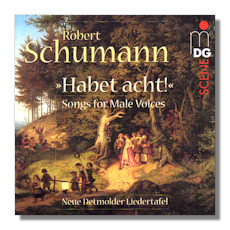
The Internet's Premier Classical Music Source
Related Links
- Schumann Reviews
- Latest Reviews
- More Reviews
-
By Composer
-
Collections
DVD & Blu-ray
Books
Concert Reviews
Articles/Interviews
Software
Audio
Search Amazon
Recommended Links
Site News
 CD Review
CD Review
Robert Schumann

Habet acht!
Songs for Male Voices
- 6 Lieder, Op. 33
- Gesänge aus Heinrich Laubes Jagdbrevier, Op. 137
- Lieder "Hunting Songs", Op. 147
- Ritornelle in canonische Weisen, Op. 65 (Excerpts)
- 3 Lieder "Revolutionary Songs"
- Lieder, Op. 62
Neue Detmolder Liedertafel
Dabringhaus & Grimm MDG6221316-2 DDD
Between 1830 and 1840, Schumann concentrated almost entirely on the piano. It was during the latter year that the composer began to take a keen interest in the song genre, and he commenced this journey with works written for male ensemble. This disc embraces the complete songs for male voices and what gems they prove to be, particularly when one hears them in one breadth.
The six Songs, Op. 33 were in fact composed during 1840 to texts by four different poets; Mosen, Heine, Goethe and Reinick. Schumann was very specific about this work and according to the performance instructions; he demanded that these songs be interpreted with "tremoling voice". They are extremely subtle compositions, full of musical irony and at times, satirical wit, displaying Schumann's ability to say all that he wants with an economy that is truly remarkable.
The Op. 62 part-songs are the fruits of a late 1847 flourish to texts by Eichendorff, Ruckert and Klopstock. At around this time, political events all around Europe were making emotions run high., and Schumann was not left unscathed as he too was caught up in the turmoil. In fact, these songs have an eerie and at times, restless timbre reflecting Schumann's tormented soul.
The three Songs composed for the Dresden Liedertafel in April 1848 only came to light posthumously in 1913-14. Written to texts by Furst, Freiligrath and Ullrich, they are known as "Revolutionary Songs" and they are compositions of a more calming and soothing nature when compared to the Op. 62. The Riornelle, Op. 65 are seven Ruckert short three-line and four-line stanzas after Italian and Persian models which Schumann set in 1847 in the form of "canons". Although short in duration, their effect is one of eloquence and beauty which is not easily forgotten.
The "Hunting Songs" Op. 147 were composed in 1849 to texts by Heinrich Laube, a young journalist who knew Schumann very well. The songs are typical of the subject they want to convey and the score aptly includes an "ad libitum" horn accompaniment, included in this recording.
The Detmold Choir under Thorsten Roth gives clean and balanced interpretations, capturing all the varied moods and nuances of these Schumann miniatures. The annotations by Thomas Synofzik as translated by Susan Marie Praeder are extremely informative and at times, minutely descriptive. It is a real pity that there are no translations to the sung German texts, otherwise this is a beautifully presented and recorded disc that will definitely satisfy both expert and beginner.
Copyright © 2005, Gerald Fenech





















